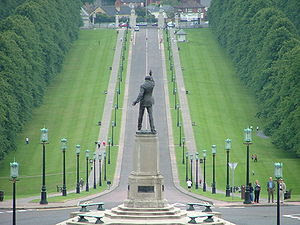‘Bankrupt relativism’, ‘an apology for terrorism’, ‘softness on crime’ are the most common, or at least most printable reproaches. Inevitably it’s supporters of the establishment who most loudly voice them, those whose outlook is essentially conservative. Unforgiving towards crime of any kind, and certainly towards any threat of violence, they are uncompromising towards a stance that seems ready to make concessions towards illegal military activity.
So this is a good weekend to look back at a time when the British establishment at least took a completely different view. And what emerge was exactly the same kind of moral relativism that it otherwise denounces so robustly.
It’s a commonplace to define the state as the body that holds a monopoly over ultimate violence. Only the state can make arrests (even in that extremely rare occurrence, a ‘citizen’s arrest’, the citizen is acting on state authority, and had better be able to justify himself in those terms if called on). Only the state can legally imprison. And only the state has the authority to raise and use armed forces.
When occasionally groups of individuals try to form themselves into organised armed groups to achieve their political ends, the state tends to take a dim view and most of society usually agrees. The people who try to to do so and, sadly, quite a few who are simply suspected of helping, get gaoled for a long time. Indeed, many of those who make the attempt outside the US may even be granted the privilege of a free trip to that country, where they receive free board and lodging indefinitely, and even have their clothing costs covered, at least at the orange jump suit level.
So it’s instructive to discover that if the establishment itself is sympathetic towards the cause espoused, it tends to be a lot more indulgent towards illegal military activity taken to advance it. When Edward Carson launched the Ulster Covenant 100 years last Friday, he threatened to use ‘all means necessary’ to resist the pressure towards home rule for Ireland.
Since he had already helped found the Ulster Volunteers, which would later accept support from Germany to become a paramilitary organisation, it was clear that the means necessary would not stop short of the use of armed force.
The British establishment was facing a serious threat of violence. But it was aimed at preserving Ireland within the United Kingdom, which wasn’t a view entirely frowned upon by most members of that establishment. A quandary for those fine upstanding figures in society.
So it will come as no surprise that Carson didn’t find himself in the 1912 equivalent of a jump suit, behind bars or in any other way incommoded in his political or social career. Not that he never faced a judge: in fact in February 1921, he faced six of them, all Lords of Appeal in Ordinary. The effect was slightly mitigated, however, by the fact that he had just become the seventh member of their august band, with in compensation for his efforts a peerage to go along with the appointment.
It seems that one man’s jump suit is another man’s ermine cloak.
 |
| Lord Carson's statue outside the Northern Ireland Parliament Honouring a fine patriot or a dangerous rebel? |
Since this is the weekend of the centenary of Carson’s insurgency, I intend to raise a glass to the historic event this evening. I hope you’ll join me, in spirit at least. Let’s toast that much-maligned though wonderfully expedient stance, that of moral relativism.
















